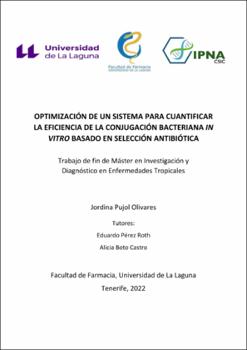Optimización de un sistema para cuantificar la eficiencia de la conjugación bacteriana in vitro basado en selección antibiótica
Autor
Pujol Olivares, JordinaFecha
2022Resumen
Antibiotic resistance has become one of the major problems in health care nowadays. Bacteria
can acquire antibiotic resistance by different natural mechanisms, but the most important is the
acquisition through horizontal gene transfer (HGT). Despite HGT can occur in three main
mechanisms, conjugation is the one that causes the greatest propagation of antibiotic resistance
genes. Conjugation is based on the transmission of conjugative plasmids which carry these
genes. One of the most promising strategies to fight antibiotic resistance is the investigation of
conjugation inhibitors (COINs).
The aim of this study was the optimization of an in vitro conjugation protocol for the
reproducible quantification of conjugation frequencies, which permits the study of anticonjugation properties of candidate chemical compounds. Also, we tried to confirm the
constitutively expression of the green fluorescent protein (GFP) in the transconjugant strain
generated.
The optimized protocol using nitrocellulose filters and antibiotic selection, employing the donor
E. coli MDS42 strain carrying plasmid pJC01 and the recipient E. coli BL21 (DE3) strain, allowed
to obtain reproducible conjugation frequencies in the order of 10-1
. Additionally, the system was
useful for the preliminary study of the possible conjugation inhibitory activity of five candidate
chemical compounds. Finally, the pJC01 plasmid in the transconjugant strain was stable under
antibiotic selection and constitutively express the GFP. This strain will be used for the
optimization of a high-throughput in vitro conjugation protocol for the rapid and cost-effective
evaluation of COIN candidates





